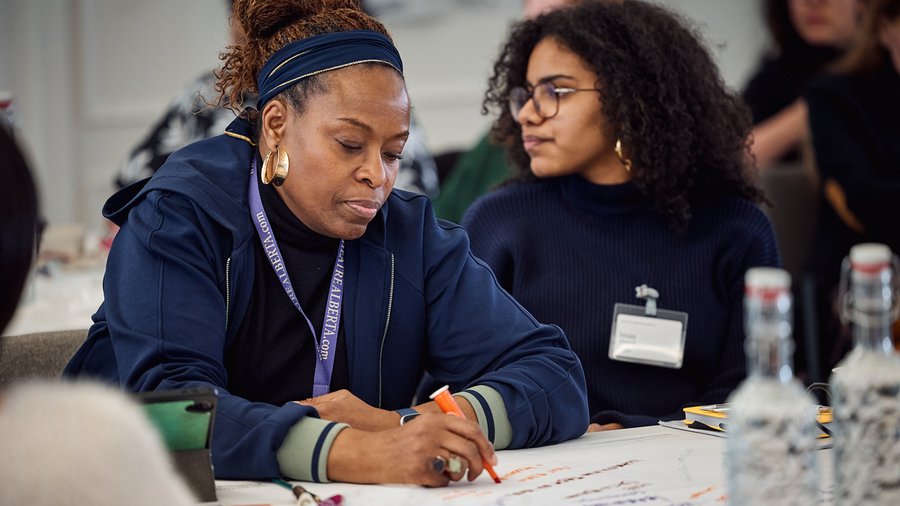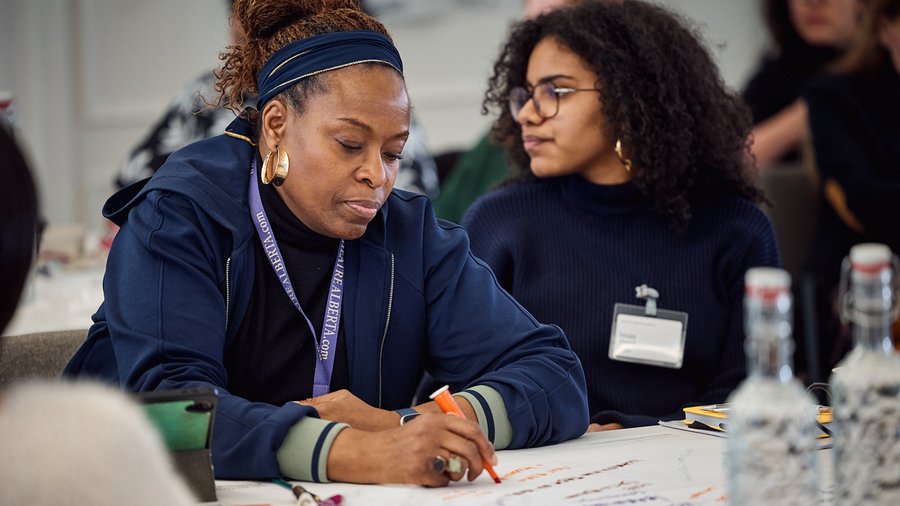This vision statement was prepared by Nike Jonah for the Culture, Arts and Society session, "Creating Futures: Art of Narrative", which occurred from April 6 to 11, 2025 .
You can listen to a recording of Nike reading this vision statement below.
I'm interested in diaspora narratives—and how they might shape, influence, or even reimagine a place, a nation, or a region.
Picking up on one of yesterday's themes going back to go forward. I'm going to go way way back to go forward.
I grew up in Liverpool, England, and like many people of African descent in the diaspora, I remember coming across "Roots" —the story that claimed to trace one African American's family's lineage through slavery back to a village in The Gambia.
Alex Haley's "Roots" was more than a book—it became a cultural phenomenon. The bestselling novel sold over six million copies in hardcover, was translated into 37 languages, and in 1977, the television miniseries became the most-watched in U.S. history at the time, reaching over 100 million viewers.
It sparked what was called "Roots mania"—a moment that offered African Americans and the wider diaspora a powerful emotional connection to a reimagined African heritage, identity, and sense of origin and a pull to the continent.
So… how many of us grew up believing "Roots" was the story of Black ancestry? The grand tale of tracing the line from the motherland—The Gambia—to slavery in the Americas and back again to villages called Albreda and Juffureh. It was epic. It was moving. It was ours.
Except… it wasn't.
As part of its tourism offering to Africans in the diaspora particularly those from [the] Global North, U.S., and the Caribbean, the Gambian Tourism Board has created a "pilgrimage" tour to the villages of Albreda and Juffureh—places visited by tens of thousands of people each year.
So imagine my surprise when, during a trip in the summer of 2016, my sister casually mentioned that it's actually unlikely Alex Haley's ancestors came from either village.
Like many people, I remembered the iconic scene in "Roots" where Haley is told that his ancestor, Kunta Kinte, came from Juffureh. It was powerful. It felt like truth. I believed it—just as so many others have.
There's a common belief that African oral historians can commit entire histories to memory—and that by simply asking the right people, the "missing pieces" of the past can be retrieved. But what I found challenges that assumption.
Alex Haley's "Roots"—which won a Pulitzer citation in 1977—wasn't a factual autobiography. It was factional: fact and fiction. It was based on research, yes, but also part fiction, part family lore, and part literary imagination. And yet, to this day, it's often described—mistakenly or not mistakenly—as a true story. The 2016 reboot even reinforced this narrative, presenting it again as a dramatized family history.
But here's the thing: this powerful fictionalized story has become embedded in Gambian identity. It feeds the tourism industry, shapes cultural narratives, and dictates how the world sees The Gambia. It's fed the "Back-to-Africa" movement that's seen an increase of diasporans relocate to The Gambia.
So—what happens when a nation's most globally recognized story is not their story—but someone else's? What stories are we missing or ignoring because Haley's myth still dominates?
What stories do we accept as "truth" that are actually well-packaged myths?
What happens when fiction becomes cultural fact?
How do we—artists, thinkers, creatives—center authentic counter-narratives? Not to discredit the power of "Roots," but to create space for stories that are rooted in lived experience?
Because maybe it's not just about tracing roots—Maybe it's about reclaiming them.
And in a time of digital migration, digital nomads, virtual communities, and online activism, how might these new digital terrains reshape diasporic identities?
How are we using them to build new connections to heritage, memory, and home?
Nike Jonah is a strategic development professional working across the cultural and creative industries worldwide. She is currently the co-executive director of the South Africa-based Pan-African Creative Exchange (PACE), a dynamic, multi-layered organization operating as a biennial arts market and a platform for promoting interdisciplinary arts in Africa. Nike's work continues to foster connections and innovation across global cultural and creative networks.
From 2017 to 2020, Nike was a visiting research fellow at the Royal Central School of Speech and Drama, where she developed her ongoing research on Pan-African Performance Networks. Earlier in her career, she led Arts Council England's Decibel Program (2008-2012), an initiative designed to support African, Asian, and Caribbean artists. Nike is a trustee of the Birmingham Contemporary Music Group and the Royal Africa Society. She also serves as an advisor to the RIGHTABOUTNOW Festival in the Netherlands and the Centre for Socially Engaged Theatre (CSET) in Canada.
This article is part of our Across our sessions and events in 2025, Salzburg Global is highlighting the central role that the African continent will play in global development now and in the next decades. As demographic trends across much of the world project a future of older and less productive economies, the African continent stands out for its growing youth population, dynamism and innovation. In reimagining an international system that better responds to the needs of the 21st century, it is our hope that Salzburg Global can play a small but meaningful role in centering African ideas, innovations, and perspectives in global forums like ours.



